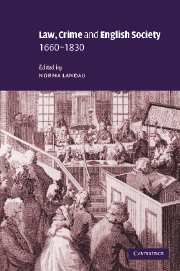Book contents
- Frontmatter
- Contents
- List of figures
- Notes of contributors
- 1 Introduction
- Part 1 Law
- 2 Dread of the Crown Office: the English magistracy and King's Bench, 1740–1800
- 3 The trading justice's trade
- 4 Impressment and the law in eighteenth-century Britain
- Part 2 Crime
- Part 3 Society
- John M. Beattie's publications
- Index
2 - Dread of the Crown Office: the English magistracy and King's Bench, 1740–1800
from Part 1 - Law
Published online by Cambridge University Press: 30 June 2009
- Frontmatter
- Contents
- List of figures
- Notes of contributors
- 1 Introduction
- Part 1 Law
- 2 Dread of the Crown Office: the English magistracy and King's Bench, 1740–1800
- 3 The trading justice's trade
- 4 Impressment and the law in eighteenth-century Britain
- Part 2 Crime
- Part 3 Society
- John M. Beattie's publications
- Index
Summary
High court judges and inferior magistrates
‘I'll prosecute you and have you in the Kings Bench … I'll have no lawyers here … I'll have you in the King's Bench for this I'll play the Devil with you.’ Many justices of the peace disliked lawyers as much as John Gough, but they did not usually bellow such threats from an upper window. The men gathered in his courtyard at Perry Hall near Walsall in the autumn of 1802 were not impressed. One of them was a wealthy farmer, William Osborne, to whom Gough had irregularly and maliciously refused bail on a charge of assault a few days before; with him was his attorney. Gough's threat of a King's Bench prosecution perhaps inspired Osborne. Within a month he began a prosecution there against Gough for misdemeanour in his office.
King's Bench, one of the three central courts of the common law, was by the later eighteenth century the most important one. The dominant figure of Lord Mansfield (Chief Justice from 1756 to 1788) increased its prestige and civil business, and it had long been the main venue for state trials and constitutional argument. It was the supreme (and only) court of criminal jurisdiction in Westminster Hall. Trials on indictment in London and Middlesex came before it, but other prosecutions, arising in the provinces, also began or ended in King's Bench, argued by the greatest barristers.
- Type
- Chapter
- Information
- Law, Crime and English Society, 1660–1830 , pp. 19 - 45Publisher: Cambridge University PressPrint publication year: 2002
- 3
- Cited by



